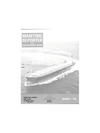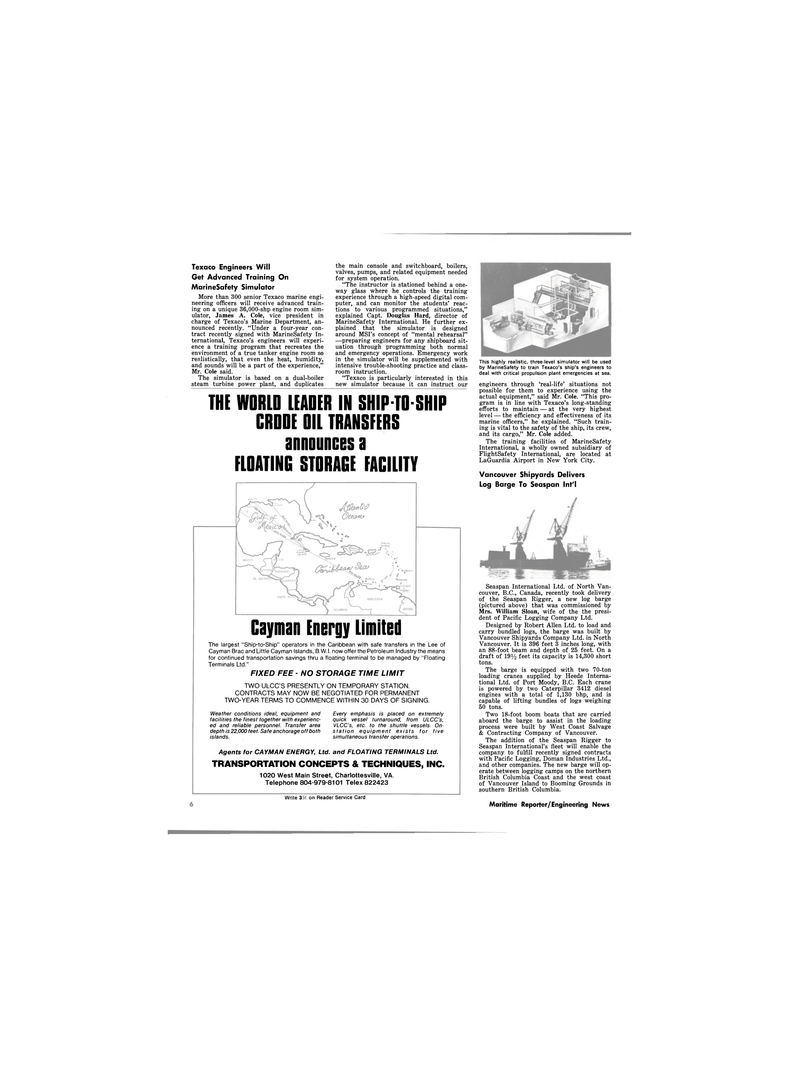
Page 4: of Maritime Reporter Magazine (December 1980)
Read this page in Pdf, Flash or Html5 edition of December 1980 Maritime Reporter Magazine
Texaco Engineers Will
Get Advanced Training On
MarineSafety Simulator
More than 300 senior Texaco marine engi- neering officers will receive advanced train- ing on a unique 36,000-shp engine room sim- ulator, James A. Cole, vice president in charge of Texaco's Marine Department, an- nounced recently. "Under a four-year con- tract recently signed with MarineSafety In- ternational, Texaco's engineers will experi- ence a training program that recreates the environment of a true tanker engine room so realistically, that even the heat, humidity, and sounds will be a part of the experience,"
Mr. Cole said.
The simulator is based on a dual-boiler steam turbine power plant, and duplicates the main console and switchboard, boilers, valves, pumps, and related equipment needed for system operation. "The instructor is stationed behind a one- way glass where he controls the training experience through a high-speed digital com- puter, and can monitor the students' reac- tions to various programmed situations," explained Capt. Douglas Hard, director of
MarineSafety International. He further ex- plained that the simulator is designed around MSI's concept of "mental rehearsal" —preparing engineers for any shipboard sit- uation through programming both normal and emergency operations. Emergency work in the simulator will be supplemented with intensive trouble-shooting practice and class- room instruction. "Texaco is particularly interested in this new simulator because it can instruct our
This highly realistic, three-level simulator will be used by MarineSafety to train Texaco's ship's engineers to deal with critical propulsion plant emergencies at sea. engineers through 'real-life' situations not possible for them to experience using the actual equipment," said Mr. Cole. "This pro- gram is in line with Texaco's long-standing efforts to maintain — at the very highest level — the efficiency and effectiveness of its marine officers," he explained. "Such train- ing is vital to the safety of the ship, its crew, and its cargo," Mr. Cole added.
The training facilities of MarineSafety
International, a wholly owned subsidiary of
FlightSafety International, are located at
LaGuardia Airport in New York City.
Vancouver Shipyards Delivers
Log Barge To Seaspan Int'l
Seaspan International Ltd. of North Van- couver, B.C., Canada, recently took delivery of the Seaspan Rigger, a new log barge (pictured above) that was commissioned by
Mrs. William Sloan, wife of the the presi- dent of Pacific Logging Company Ltd.
Designed by Robert Allen Ltd. to load and carry bundled logs, the barge was built by
Vancouver Shipyards Company Ltd. in North
Vancouver. It is 396 feet 3 inches long, with an 88-foot beam and depth of 25 feet. On a draft of 19i/2 feet its capacity is 14,300 short tons.
The barge is equipped with two 70-ton loading cranes supplied by Heede Interna- tional Ltd. of Port Moody, B.C. Each crane is powered by two Caterpillar 3412 diesel engines with a total of 1,130 bhp, and is capable of lifting bundles of logs weighing 50 tons.
Two 18-foot boom boats that are carried aboard the barge to assist in the loading process were built by West Coast Salvage & Contracting Company of Vancouver.
The addition of the Seaspan Rigger to
Seaspan International's fleet will enable the company to fulfill recently signed contracts with Pacific Logging, Doman Industries Ltd., and other companies. The new barge will op- erate between logging camps on the northern
British Columbia Coast and the west coast of Vancouver Island to Booming Grounds in southern British Columbia. 6 Maritime Reporter/Engineering News
THE WORLD LEADER IN SHIP-TO-SHIP
CRDDE OIL TRANSFERS announces a
FLOATING STORAGE FACILITY
Cayman Energy Limited
The largest "Ship-to-Ship" operators in the Caribbean with safe transfers in the Lee of
Cayman Brae and Little Cayman Islands, B. W. I. now offer the Petroleum Industry the means for continued transportation savings thru a floating terminal to be managed by "Floating
Terminals Ltd."
FIXED FEE • NO STORAGE TIME LIMIT
TWO ULCC'S PRESENTLY ON TEMPORARY STATION.
CONTRACTS MAY NOW BE NEGOTIATED FOR PERMANENT
TWO-YEAR TERMS TO COMMENCE WITHIN 30 DAYS OF SIGNING.
Weather conditions ideal, equipment and facilities the finest together with experienc- ed and reliable personnel. Transfer area depth is 22,000 feet. Safe anchorage off both islands.
Every emphasis is placed on extremely quick vessel turnaround, from ULCC's,
VLCC's, etc. to the shuttle vessels. On- station equipment exists for five simultaneous transfer operations.
Agents for CAYMAN ENERGY, Ltd. and FLOATING TERMINALS Ltd.
TRANSPORTATION CONCEPTS & TECHNIQUES, INC. 1020 West Main Street, Charlottesville, VA.
Telephone 804-979-8101 Telex 822423
Write 373 on Reader Service Card

 3
3

 5
5
